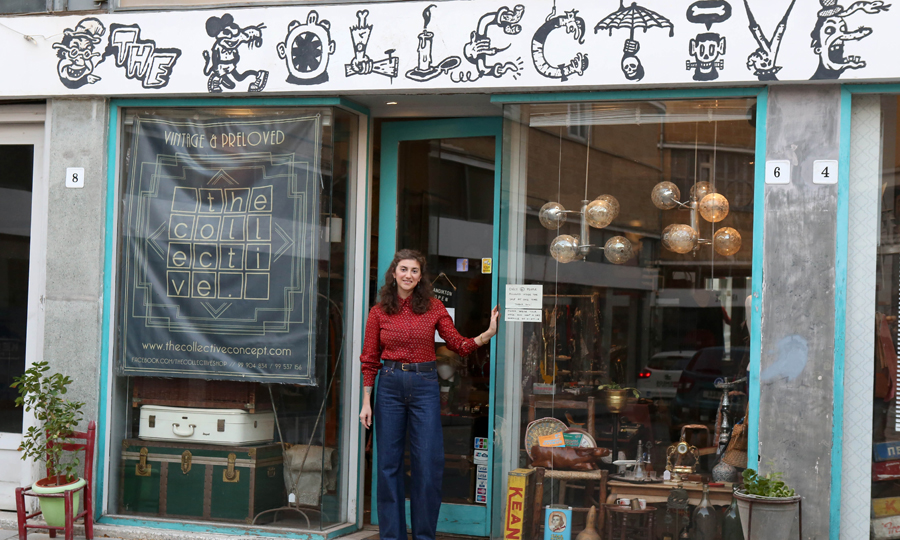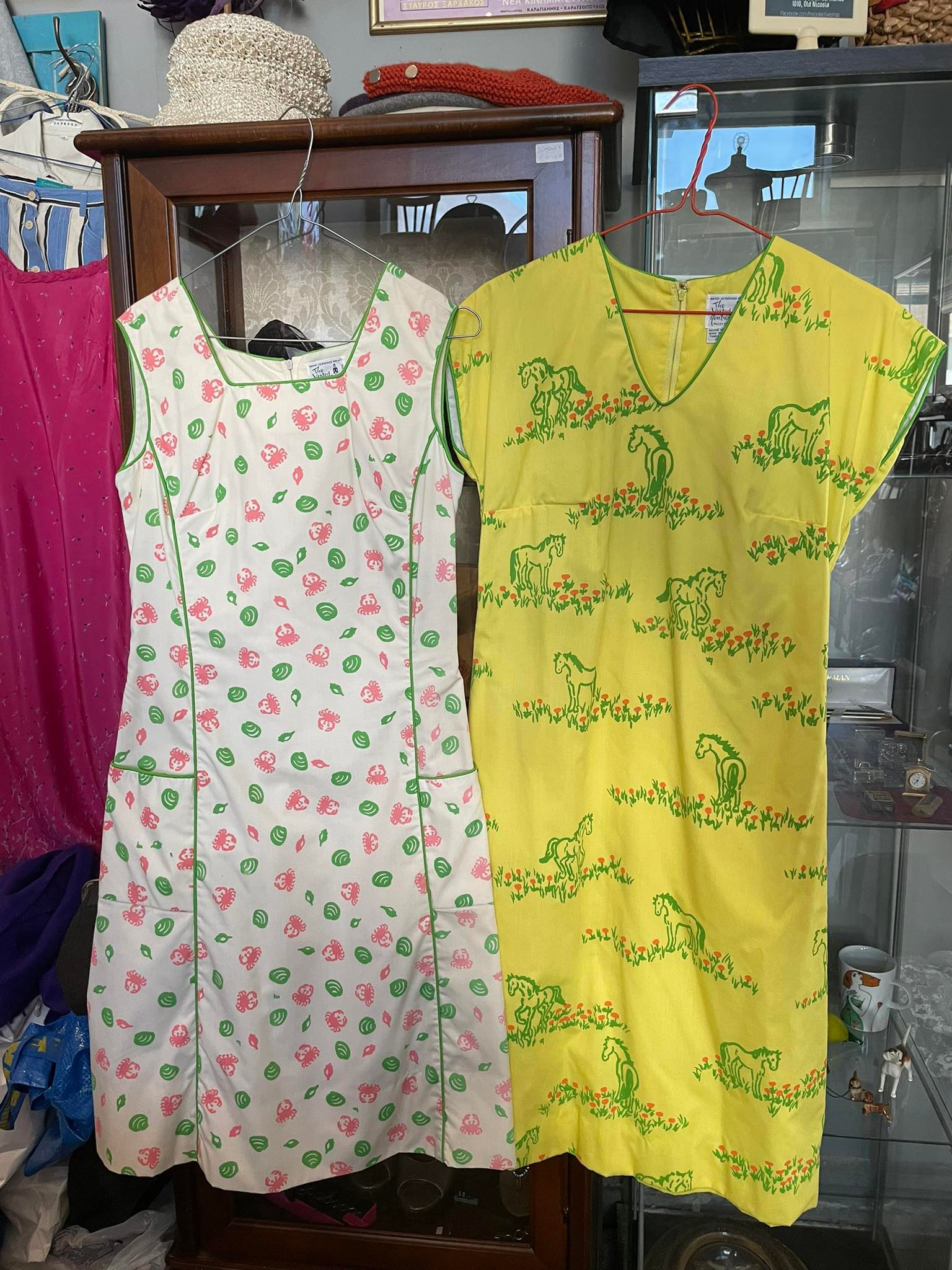
by Ioanna Kyriakou
Her love for vintage, her concerns for the environment, and what she had seen working for one of the most famous high-end brands in the world, led Natasha Theodotou to load a container full of things she had collected since she was a child, return to Cyprus and open a vintage store in Old Nicosia. Natasha tells "K" how, together with her cousin Paris, she opened a store that takes you back in time and also talks about the relationship she has developed with customers and locals, about how Cypriots respond to idea of vintage, and about the importance of sustainability.
Having studied Fashion Merchandising in London and being a collector of items from a young age, Natasha always wanted to open something of her own. When she decided to return to Cyprus after her studies, she put everything she had in a container and opened a small pop-up store for about three months, together with her cousin Paris, who is also a collector and repairs old bicycles.
In fact...many people are not aware of the conditions under which factory workers work, the rate of waste in Cyprus and the fact that most of the things we recycle are not even recyclable.
The response was positive, which resulted in the opening of "The Collective" in the heart of the old city, which has been operating since 2016.
The idea of "The Collective" came from a combination of factors. During her stay in London, Natasha worked at Ted Baker's headquarters in London, where she handled stock for international stores. "I saw the whole process, from designing a garment to finishing it. It was then that the international community began to be concerned about climate change.
 Many people are not aware of the conditions under which factory workers work, the rate of waste in Cyprus and the fact that most of the things we recycle are not even recyclable.
Many people are not aware of the conditions under which factory workers work, the rate of waste in Cyprus and the fact that most of the things we recycle are not even recyclable.
Positive response
Cypriot interest in vintage, especially young people, has undoubtedly increased in recent years, however, according to the co-owner of the store, as a society, we still have a long way to go. As she explains, the response of young people to the idea of vintage can be described as a "double-edged sword", as many have developed an interest in it because it is fashionable, but ultimately every trend at some point ends. She emphasized that the work becomes even more difficult because we are surrounded by clothing stores and shopping malls, which "bombard" us every day with images. "Vintage is now in vogue and all stores are full of 90s' looks, oversized and grunge clothes."
Journey to the past
Vintage, in addition to fashion and lifestyle, is also a piece of the past. Natasha often receives various items from customers, behind which is hidden a story. A typical example is an American woman, who only bought "The Vested Gentress" brand dresses from the store. Not having heard of the brand before and searching the internet, Natasha found it to be a 1960s brand created by an American couple. The couple designed these dresses mainly for women who went golfing. In fact, the designs on the dresses were hand-printed.
Another time, a man went to the store with the clothes of his mother, who was once a member of the "high society" of Nicosia. These were evening dresses, one of which was a velvet maxi with rhinestones and the other an old Christian Dior suit of the '60s. "I just pictured this lady at the city parties at the time," she said, adding that there were times people walked into the store and were moved to see objects from their childhood.
Old Nicosia functions as a pole of attraction for the store, as the history carried by the people and the buildings of the city "mixes" with that of the objects, thus contributing to the aesthetics of the space. "I met the most incredible people in the old town, from Mr. Andreas, the tailor next door, to Ms. Giota, who has the cafe across the street," says Natasha, noting that Mr. Andreas' shop has holes in the walls from the bullets of war. "Mrs. Giota keeps telling me about her childhood in the old town, when she went to school in Faneromeni and about how she studied to become an architect but then took over her father's job. "Through the conversations I have with these people, I know my culture better and I feel prouder of my place."
Importance in ensuring and promoting sustainability

Speaking to Kathimerini, Natasha referred to the importance of research, education and the right legislation to ensure and promote sustainability. As she explains, there are three elements that one must keep in mind to recognize if something is sustainable. The first is the human element. A product is only viable if the employee who manufactured it worked under good working conditions. If, for example, a garment is made of organic cotton, but the person who made it works in miserable conditions, then the product is not viable.
The second element is our planet and it concerns the resources that were needed to create a product and how they affect the environment. If the working conditions are suitable but the environment is polluted during the production process, then the product is not viable.
The third element concerns profit and has to do with corporate social responsibility. In short, if at some point in the production process of a product someone or something is negatively affected, then this may not be sustainable.
"Talking to customers and informing them about the environment can be a good start for people to realize that there are alternatives," Natasha told me. "When I see that people want to know, I enter into more serious discussions with them. I try to show them that most things that are now fashionable were, at some point, fashionable in the past. So you do not need to buy new clothes to achieve a look, you can get used ones and make the look your own".
In fact, as she notes, many people are not aware of the conditions under which factory workers work, the rate of waste in Cyprus and the fact that most of the things we recycle are not even recyclable. "People think they're throwing their clothes in the bins and doing their part, but most of the clothes end up in the rivers of Africa," she said. "Our hope is in young people, who are now more aware of environmental issues."
































